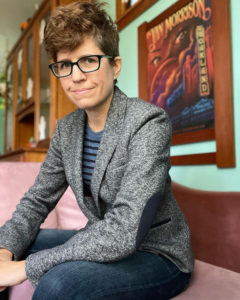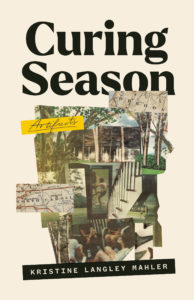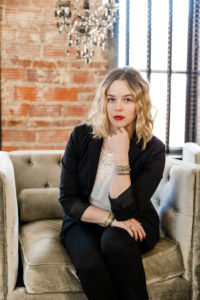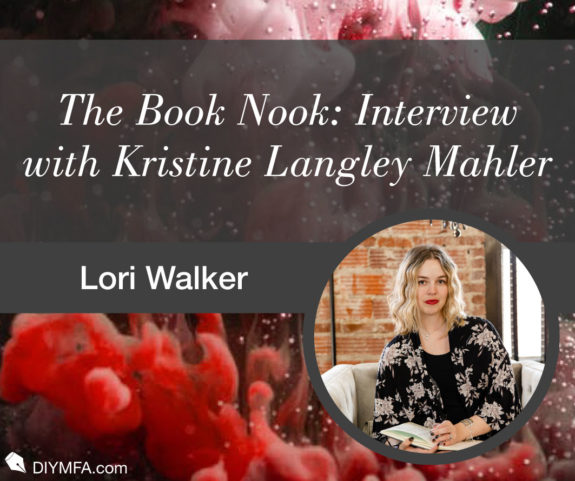Today I had the privilege of interviewing Kristine Langley Mahler, author of the experimental memoir in essays, Curing Season. As a non-fiction writer myself, I was thrilled to have the opportunity to pick her brain about her process and her career. Plus, I loved getting some inside scoop on how to experiment more with my writing.
I hope you enjoy this interview!
About Kristine Langley Mahler
Kristine Langley Mahler is a memoirist experimenting with the truth on the suburban prairie outside Omaha, Nebraska, a city ridging the backbone of the West and the Midwest. Her debut essay collection, Curing Season: Artifacts is out now. A second collection of essays, A Calendar is a Snakeskin, is forthcoming with Autofocus in spring 2023.
Kristine is the recipient of a 2021 Individual Artist Fellowship from the Nebraska Arts Council and her work has been named Notable in Best American Essays (2019 and 2021), received the Rafael Torch Award from Crab Orchard Review, won the Sundog Lit Collaboration Contest, and is published in DIAGRAM, Ninth Letter, Brevity, and Speculative Nonfiction, among others. She is the director and publisher of Split/Lip Press.
You can find her on her website or follow her on Twitter.
About Curing Season
After spending four years of adolescence in suburban North Carolina, Kristine Langley Mahler, even as an adult, is still buffeted by the cultural differences between her pioneer-like upbringing in Oregon and the settled southern traditions into which she could never assimilate. Collecting evidence of displacement—a graveyard in a mall parking lot, a suburban neighborhood of white kids bused to desegregate public schools in the 1990s, and the death of her best friend—Curing Season is an attempt to understand her failed grasp at belonging.
Mahler’s yearning for acceptance remains buried like a splinter, which she carefully tweezes out in the form of artifacts from her youth. But it isn’t until she encounters a book of local family histories that she takes inhabitation and truth apart, grafting and twisting and imprinting her history on theirs, until even she can no longer tell the difference between their truth and her own. Using inventive essay forms, Mahler pries apart the cracks of exclusion and experiments with the nature of belonging, memory, and place. Curing Season is a coming-of-age memoir for anyone who grew up anywhere but home.
Interview with Kristine Langley Mahler
Lori Walker: First off, I’d love to hear a bit about how you became a writer. What has your journey as an author been like? What drew you to essays?
Kristine Langley Mahler: I’ve been a diehard essayist—though I’ve really leaned into using the term “memoirist” instead since it feels more accurate—since I was a senior in high school and my writing teacher gently pointed out that the thing I was writing was actually creative nonfiction—I literally didn’t know that there was a term for “short stories that actually happened.” This was the early internet era (1999)! I’ve been writing nonfiction ever since.
I can’t make up worlds or stories to save my life, but I am so committed to and fascinated by looking at the ways we tell ourselves stories about our lives and trying to distinguish between truth and shaped-truth.
LW: What does a typical day of writing look like to you?
KLM: This is like the exact opposite of the writing advice most people give, but after years of experience, this is what it looks like for ME: I spend a lot, a lot, a lot of time NOT writing. A lot of time walking (without my phone), trying to pay attention to where I am, letting my mind wander. I spend a lot of time sitting on my couch and staring, letting the eyes go fuzzy, going into the subconscious brain.
As a memoirist, I honor the knowledge that I am collecting experiences every day and that they are often not ready to be processed right away. In the same vein, I try to stay open to those memories/experiences which are making their way to the surface. When they do, that’s when I write. Sometimes it’s a phrase or a memory I want to write down, sometimes it’s an idea for an essay form.
When I’m ready, I’m READY! And then it’s go-time—whenever I can grab a chunk of time in front of the laptop, and when I can’t, I’m voice-texting in my iPhone’s notes.
LW: You have a number of publication credits to your name, both essays and articles. What is your advice for writers wanting to make a career out of freelance writing?
KLM: I have a good number of publication credits, but I don’t have a very good freelancing career! Most of my publications have been in university-sponsored literary journals, which often don’t pay (or pay in author copies of the journal). I think I could count on ten fingers the number of times I’ve received an actual honorarium for my work.
So take this advice with a grain of salt, but I would argue that as a writer, you need to consider your specific voice. If you are driven to write more experimentally in your non-paid work, using your time to write articles for a mass audience can deplete your creative energy. I say this as someone who has spent the past few months only writing articles or responding to interviews to help support Curing Season—I miss my creative energy! One really does come at the cost of another.
LW: Do you have a process for generating ideas to write about? What does that look like?
KLM: I’ve been writing toward my next book, which is a collection of essays about ancestry and the privilege of home, and so recently I’ve been looking at all of my homes and thinking about what I want to say about them.
I’m kind of terrible at generating writing topics—my work drafts are the most surprising and interesting when I don’t know where they’re going—so rather than coming up with specific ideas of “what to write about” explicitly, I like to use prompts someone else has created because there are always memories or moments floating around in my head but they only come out to respond to a prompt.
LW: I’m always curious about the process of putting together a collection. Did you write a bunch of essays, then realize that there was a theme, or did you choose the theme of not belonging and write essays to fit it?
KLM: I’d originally thought Curing Season was a different book! I had written an essay collection all about home and belonging, but it wasn’t working so I spent the summer of 2020 taking the old book apart and bringing together a large subcurrent within the old book: all the essays about my adolescence in Pitt County, North Carolina. Once I saw them together, it was obvious that they were a complete narrative on their own.
LW: The Curing Season is an experimental collection. You have essays that take on the physical appearance of a shadowbox and a list, to name a couple. What can you tell us about your process for these experimental forms? How did you know the experiment would be successful? How did you come up with the form for the content of the essay?
KLM: Honestly, I was surprised by how many formal structures I ended up using in these essays. The essays were not written with each other in mind, and it startled me to realize that most of the work I’d written about Pitt County and my adolescence seemed to have almost REQUIRED me to use alternate forms to approach that subject matter.
It’s clear to me now that I had to experiment with an essay’s shape because of how much I had both wanted to create structure out of that time and how much I felt constrained by the cultural structures I didn’t build.
The specific forms are specific to the essays themselves—“Not Something That’s Gone” and “Mädchenfänger,” for instance, are both about a friendship that has a closure and the closed forms of the essays (looping phrases that enclose the narratives) echo that feeling.
LW: A lot of authors are creating playlists to accompany their books, but this being a reading column, I’d like to know what your “reading playlist” is. What books should people read after reading Curing Season?
KLM: Sleepovers by Ashleigh Bryant Phillips; Girlhood by Melissa Febos; Cat’s Eye by Margaret Atwood.

Lori Walker is the Operations Maven at DIY MFA. Though she’s fallen off the wagon as a writer, she’s hoping to return to writing essays (perhaps even a novel!) through her involvement with DIY MFA. She is also Launch Manager, Web Editor, and Podcast Producer for DIY MFA and a Book Coach. She resides in Smalltown, Oklahoma, with her husband and their cat, Joan Didion. You can follow her on Instagram at @LoriTheWriter.







